 | |
Austria | Canada |
|---|---|
Diplomatic relations between Austria and Canada centres on the history of Austrian migration to Canada. Approximately 200,000 Canadians have Austrian ancestry. [1] Both nations are members of the OECD and the United Nations.
 | |
Austria | Canada |
|---|---|
Diplomatic relations between Austria and Canada centres on the history of Austrian migration to Canada. Approximately 200,000 Canadians have Austrian ancestry. [1] Both nations are members of the OECD and the United Nations.
In 1855, the Austro-Hungarian Empire opened a consulate in Halifax. [2] The first large wave of Austrian migrants to arrive to Canada occurred in the early 20th century. [1] In 1902, a consulate was established in Montreal. During World War I, both nations fought on opposing sides and confronted each other primarily in France during the Hundred Days Offensive. After Austria's annexation by Germany (Anschluss) several Austrian refugees immigrated to Canada. [1]
Soon after World War II, Austria opened a consulate-general in Ottawa in 1949. In 1952, Austria and Canada officially established diplomatic relations and in 1958 Austria opened a resident embassy in Ottawa. [2]
Relations between both nations follow their mutual commitment to multilateralism, trade and investment and increasing people-to-people ties. [2] There have been several visits between leaders of both nations.
In 2022, both nations celebrated 70 years of diplomatic relations. [3]
Both nations have signed several bilateral agreements such as an Agreement for the Avoidance of Double Taxation and the Prevention of Fiscal Evasion with Respect to Taxes on Income and on Capital (1976); Agreement on Social Security (1987); Extradition treaty (2000); and an Agreement for a Working Holiday Program (2018). [4] [5] [6]
There are direct flights between both nations with Air Canada and Austrian Airlines.
In October 2016, Canada and the European Union (which includes Austria) signed a free trade agreement known as the "Comprehensive Economic and Trade Agreement". In 2018, trade between Austria and Canada totaled $2.3 billion. Austria's main exports to Canada include: machinery and equipment, and pharmaceutical based products. Canada's main exports to Austria include: aircraft products, machinery and vehicles. [7] [8]
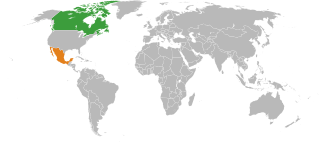
The nations of Canada and Mexico established formal diplomatic relations in 1944. Initially, ties between the two nations were dormant, but since the 1990s relations between Canada and Mexico have positively developed as both countries brokered NAFTA.

The nations of Greece and Mexico established diplomatic relations in 1938. Early Greek migration to Mexico contributed to the industrial agricultural development of the North-Western Pacific state of Sinaloa. Both nations are members of the Organisation for Economic Co-operation and Development and the United Nations.
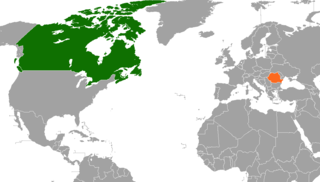
Canadian-Romanian relations are the bilateral relations between the governments of Canada and Romania. Canada has an embassy in Bucharest. Romania has an embassy in Ottawa and three consulates-general. Romania has also three honorary consulate general in Moncton, Québec and Calgary.

Bilateral relations between the Argentine Republic and Canada have existed for over a century. Both nations are members of the Cairns Group, G20, Organization of American States and the United Nations.
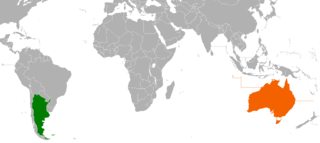
Bilateral relations between Argentina and Australia have existed for years. Both nations are members of the Cairns Group, Forum of East Asia–Latin America Cooperation, G20 and World Trade Organization.

Canada and Chile established diplomatic relations in 1892. Both nations are members of the Asia-Pacific Economic Cooperation, Cairns Group, Organization of American States, and the Organisation for Economic Co-operation and Development.

Canada-Swiss relations are foreign relations between Canada and Switzerland. Both countries are members of the Francophonie and the United Nations.

Australia and Chile enjoy friendly relations, the importance of which centers on the history of Chilean immigration to Australia. In 2016, over 26,000 Chilean-born people lived in Australia. Chile is geographically the closest country in the Americas to Australia, and both administer several islands in the South Pacific. The two nations are members of the Asia-Pacific Economic Cooperation, Cairns Group and the OECD.
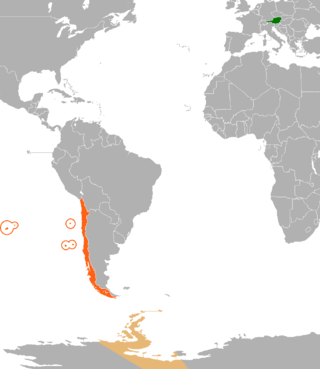
Austria–Chile relations are the bilateral relations between Austria and Chile. Both nations are members of the Organisation for Economic Co-operation and Development and the United Nations.

The nations of Austria and Mexico established diplomatic relations in 1842. Relations were strengthened in 1864 when Archduke Maximilian of Austria became Emperor of Mexico, however, after his execution, diplomatic relations were severed until 1901. Diplomatic relations were once again disrupted in 1938 during the Anschluss and relations were fully restored after World War II.

Bilateral relations between Canada and Hungary are centred on the history of Hungarian migration to Canada. Approximately 300,000 Canadians have Hungarian ancestry. Both nations are members of NATO, OECD and UN.

Canada and Italy. Both nations enjoy friendly relations and are close allies and partners through their membership in the G7, G20, NATO and the Organisation for Economic Co-operation and Development. Relations also centre on the history of Italian migration to Canada; approximately 1.5 million Canadians claim to have Italian ancestry.

Mexico–South Africa relations are the diplomatic relations between the United Mexican States and the Republic of South Africa. Both nations are members of the G-20 major economies, Group of 24 and the United Nations.

Diplomatic relations exist between Armenia and Canada. Both nations are members of the Organisation internationale de la Francophonie and the United Nations.
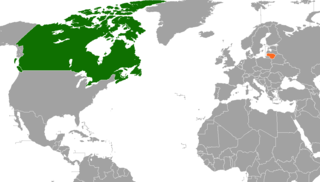
Canada and Lithuania have long-standing foreign relations. Diplomatic relations were first established in 1937. Canada never recognized the annexation of Lithuania into the Soviet Union, and after Lithuania regained its independence in 1991, the two countries re-established diplomatic relations in 1991. Both countries are full members of NATO and the Organization for Security and Co-operation in Europe.
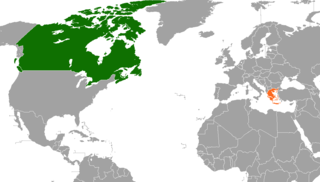
Canada and Greece first exchanged ambassadors in 1942. Both countries are members of the Organisation for Economic Co-operation and Development, Organisation internationale de la Francophonie, Organization for Security and Co-operation in Europe, NATO and the United Nations. There is a strong Greek community living in Canada.

Canada and Singapore have maintained diplomatic relations since 1965. Both nations are members of the Asia-Pacific Economic Cooperation, Commonwealth of Nations and the United Nations.

Canada and Portugal have friendly bilateral relations, the importance of which center on the history of Portuguese migration to Canada. Canadians of full or partial Portuguese ancestry number approximately 482,000 people. Both nations are members of NATO, the OECD, and the United Nations.

The nations of Mexico and Portugal established diplomatic relations in 1864. Both nations are members of the Organization of Ibero-American States, Organisation for Economic Co-operation and Development and the United Nations.

The nations of Mexico and Slovakia established diplomatic relations in 1993. Relations between both nations existed beginning in 1922 when Slovakia was part of Czechoslovakia until its separation from the union in 1992.